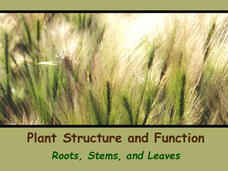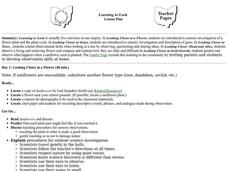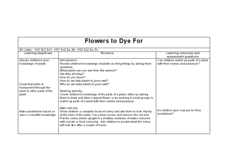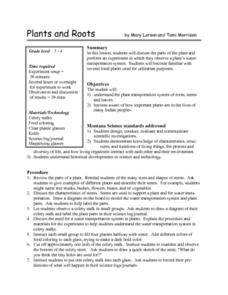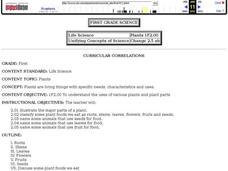Science 4 Inquiry
Plant Structures Lab Stations
In China, hibiscus is known as the shoe flower because it is used to polish shoes, while in Hawaii, it is honored as the state flower. Young scientists learn about the structure and function of flowers. They dissect hibiscus flowers,...
Scholastic
Study Jams! Roots and Stems
Six slides come with information about roots and stems. In addition to the slide show, find a seven-question, multiple choice quiz and vocabulary guide. As a homework assignment, get your class to view the slides, take the quiz, print...
Purdue University
Bio Inspired Design Paper Flowers
Can paper flowers have some of the same properties as real flowers? First, learners investigate how water is absorbed into a flower through capillary action by using real flowers, yarn, and paper. Then, they have an opportunity to create...
Biology Junction
Plant Structure and Function: Roots, Stems, and Leaves
Scientists found fossils of plants more than 420 million years old—but plants existed for up to 100 million years prior to these fossils. Learn about the importance of plants to the entire planet. Viewing a presentation helps scholars...
New South Wales Department of Education
History of Plant Classification
Bamboo, the fastest growing plant in the world, can grow up to 35 inches in one day! Pupils learn how plants historically have been classified and determine if these traits are appropriate to use in this 17th lesson of 20. They will also...
Curated OER
The Plant
Here is a good, basic, and solid lesson plan on the parts of a plant. Young biologists learn about the parts of a plant, and what each one does. Additionally, learners look at the parts of plants that are used by people and determine...
Biology Junction
Seed Plants: Gymnosperms and Angiosperms
One of the reasons plants found success on land relates to seed development. Scholars learn about many different forms of seeds and how they changed over time. It describes the structure and function of many different types of seeds in...
Curated OER
Flowers
Young scholars study the parts of any flower and the conditions under which the plant thrives. They collect photographs and drawings to help create an accurate, realistic sculpture. They illustrate and label the flower parts and take...
Curated OER
Six Plant Parts
Young scholars create a harvest burrito out of fruit, flowers, roots, stems, and more. In this plants lesson plan, students go out into the garden and identify the 6 plant parts.
Curated OER
Parts of the Plant and Their Functions
Delving into this slideshow will help the students understand the composition of plants and their structures. Each slide identifies certain structures and explores how they support the plant's survival along with assisting our...
Curated OER
Plants
In this plants worksheet, students will review the basic steps of photosynthesis, how materials are transported through a plant, and the process of plant reproduction. This worksheet is a graphic organizer.
Curated OER
Learning To Look
Sixth graders investigate a flower plant and the plant cycle. They extend observational skills when looking at a tree by observing, questioning and sharing ideas. They observe a living and nonliving flower and compare and contrast how...
Curated OER
Tops and Bottoms
While the graphics are enticing, this presentation could be enhanced for use as part of a lesson on plants. The resource groups common foods into those that could be considered the tops or the bottom. For example, a mushroom is a part of...
Curated OER
Flowers to Dye For
Students observe biology by completing a plant experiment in class. In this botany lesson, students discuss the anatomy related to a plant and how roots and stems are necessary to its survival. Students utilize food coloring and examine...
Curated OER
How Do Parts Help Classify Plants?
In this classifying plants worksheet, students will brainstorm different types of roots, stems, and leaves and determine how those differences help scientist classify plants into different categories.
Curated OER
Plants and Roots
Students discuss the parts of the plant and
perform an experiment in which they observe a plant's water
transportation system. They become familiar with
several local plants used for utilitarian purposes.
Curated OER
Plants
Learners illustrate the major parts of a plant, classify some plant foods we eat as roots, stems, leaves, flowers, fruits and seeds. They also name some animals that use seeds, leaves, and fruit for food.
Alabama Learning Exchange
The Amazing Antigravity Stem
Second graders investigate how the stem of the plant carries water and minerals upwards from the roots to other parts of the plant. They observe what happens after a flower is placed in dyed water. They word process their observations...
Alabama Learning Exchange
Why Roots, Stems, and Leaves are Important
Young scholars use the Internet to research the importance of leaves, stems and roots to plants. They participate in a hands-on experiment to identify the functions of different plant parts.
Curated OER
Edible Plants
Students determine what part of a plant they are eating when they eat different fruits and vegetables.
Curated OER
How Do Plants Carry Out Life Processes?
In this plants worksheet, students write in how a plant's leaves, roots, and stems help it to live. This worksheet is a graphic organizer.
Curated OER
How Do Plants Move Materials?
In this plant worksheet, students will write 1 main idea on how plants move materials. Then students will write in 3 details about how nonvascular and vascular plants moves materials including the upward flow of water. This worksheet is...
Curated OER
Stem Cuttings
Young scholars select the best non-flowering stems of plants and remove the leaves from the soon to be buried portion of the stem. They fill seedling flats with soil and insert the cuttings, label, and water.
Science Buddies
Science Buddies: Shoots: How Do Mint Plants Branch to Form New Stems?
Do you like to climb trees? The branches of trees are what make them so fun to climb. Each branch starts out as a tiny shoot that grows out from a stem. How is the growth of shoots along a stem regulated?





